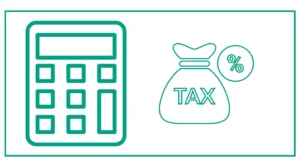The cost basis calculator is designed to calculate the stock cost basis, your stock profit, and your profit percentage.
Simply enter the number of shares and each buy’s share price, and the current stock price to calculate.
In case you don’t know, the Purchase price is the cost basis. Your cost basis for a stock, mutual fund, or real estate investment is its purchase price.
Tracking your cost basis can help you estimate your profit or loss if you sell your asset.
You might want to determine the MIRR or want to calculate the doubling time.
What is Cost Basis?
Cost basis, also known as tax basis, refers to the original value of an asset for tax purposes. In the context of stocks, it represents the total amount an investor has invested in a particular security, including the purchase price and any additional costs such as commissions or fees. Understanding your cost basis is essential for calculating capital gains or losses when you sell your shares.
Why Cost Basis Matters
Knowing your cost basis is crucial for several reasons:
- Tax calculations: The cost basis is used to determine your capital gains or losses when you sell your stocks, which directly impacts your tax liability.
- Performance evaluation: It helps you accurately assess the performance of your investments over time.
- Investment decisions: A clear understanding of your cost basis can inform future investment choices and help you optimize your portfolio.
How to Calculate Cost Basis
Calculating the cost basis of a stock can be straightforward for simple purchases, but it can become complex when dealing with multiple transactions, dividend reinvestments, or corporate actions like stock splits or mergers. Here’s a basic method to calculate cost basis:
- Determine the original purchase price of the shares.
- Add any commissions or fees paid during the purchase.
- If applicable, adjust for stock splits, mergers, or other corporate actions.
- Account for any dividend reinvestments or additional share purchases.
Let’s look at a simple example:
You purchase 100 shares of XYZ stock at $50 per share and pay a $10 commission. Your initial cost basis would be:
(100 shares × $50) + $10 commission = $5,010
Your cost basis per share would be $5,010 ÷ 100 shares = $50.10 per share.
Using Our Cost Basis Calculator
Our cost basis calculator, also known as a stock average calculator, is a tool designed to simplify the process of calculating your cost basis, especially when dealing with multiple transactions or complex scenarios. Here’s how to use a typical cost basis calculator:
- Enter the number of shares purchased in each transaction.
- Input the purchase price per share for each transaction.
- Add any additional costs, such as commissions or fees.
- If applicable, enter information about dividend reinvestments or corporate actions.
- The calculator will then compute your total cost basis and average cost per share.
Benefits of Using a Cost Basis Calculator
- Accuracy: Reduces the risk of errors in manual calculations, especially for complex scenarios.
- Time-saving: Quickly computes cost basis for multiple transactions.
- Scenario analysis: Allows investors to easily calculate the impact of potential trades on their overall cost basis.
- Tax preparation: Helps in preparing accurate tax returns by providing precise capital gains or losses information.
Advanced Considerations in Cost Basis Calculations
While the basic concept of cost basis is straightforward, several factors can complicate the calculation:
Dividend Reinvestments
When dividends are reinvested to purchase additional shares, these transactions affect your cost basis. Each reinvestment is essentially a new purchase, increasing your total cost basis and the number of shares you own.
Stock Splits and Mergers
Corporate actions like stock splits or mergers can significantly impact your cost basis. For example, in a 2-for-1 stock split, your number of shares doubles, but the cost basis per share is halved.
Wash Sales
If you sell a stock at a loss and repurchase the same or a substantially identical security within 30 days before or after the sale, the IRS considers this a wash sale. In this case, you cannot claim the loss for tax purposes, and the disallowed loss is added to the cost basis of the repurchased shares.
Inherited Stocks
For inherited stocks, the cost basis is typically the fair market value of the security on the date of the previous owner’s death, rather than the original purchase price.
Adjusted Cost Basis
The adjusted cost basis takes into account various factors that can alter your original cost basis over time. These adjustments are crucial for accurate tax reporting and performance evaluation. Factors that can lead to an adjusted cost basis include:
- Return of capital distributions
- Reinvested dividends
- Stock splits or reverse splits
- Mergers and acquisitions
- Spin-offs
Calculating the adjusted cost basis can be complex, which is why many investors rely on cost basis calculators or professional advice to ensure accuracy.
Importance of Cost Basis for Tax Purposes
Understanding your cost basis is particularly important when it comes to tax reporting. When you sell a stock, you’ll need to report the transaction to the IRS, including your cost basis and the resulting capital gain or loss. Accurate cost basis information helps ensure that you’re paying the correct amount of taxes on your investment gains.
Short-term vs. Long-term Capital Gains
The holding period of your investment, determined by your cost basis, affects how your capital gains are taxed:
- Short-term capital gains (holdings of one year or less) are typically taxed at your ordinary income tax rate.
- Long-term capital gains (holdings of more than one year) often qualify for lower tax rates.
Common Challenges in Cost Basis Calculation
While a cost basis calculator can simplify many aspects of the process, investors may still face challenges:
- Missing records: If you’ve lost track of your original purchase information, reconstructing your cost basis can be difficult.
- Complex corporate actions: Mergers, spin-offs, and other corporate events can complicate cost basis calculations.
- Multiple lots: When selling partial positions, determining which specific shares were sold (and their corresponding cost basis) can be tricky.
Tips for Managing Your Cost Basis
To make the most of your cost basis calculator and simplify your investment tracking:
- Keep detailed records of all your stock transactions, including purchase dates, prices, and any associated fees.
- Regularly update your records to account for dividend reinvestments and corporate actions.
- Consider using accounting methods like FIFO (First In, First Out) or specific identification for consistent cost basis tracking.
- Utilize brokerage statements and year-end tax documents to verify your calculations.
When to Seek Professional Advice
While cost basis calculators are powerful tools, there are situations where consulting a tax advisor or financial professional may be necessary:
- Complex investment scenarios involving multiple corporate actions
- Inherited or gifted stocks with unclear original values
- Significant tax implications from large investment sales
- Situations involving international investments or special tax rules
A professional can provide personalized advice and ensure that your cost basis calculations comply with current tax laws and regulations.





